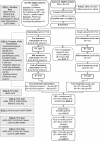A nurse- and peer-led support program to assist women in gynaecological oncology receiving curative radiotherapy, the PeNTAGOn study (peer and nurse support trial to assist women in gynaecological oncology): study protocol for a randomised controlled trial
- PMID: 23399476
- PMCID: PMC3576284
- DOI: 10.1186/1745-6215-14-39
A nurse- and peer-led support program to assist women in gynaecological oncology receiving curative radiotherapy, the PeNTAGOn study (peer and nurse support trial to assist women in gynaecological oncology): study protocol for a randomised controlled trial
Abstract
Background: Women who undergo radiotherapy for gynaecological cancer (GC) can experience distressing side effects which impact on psychosocial functioning and intimate relationships. Cancer-related distress may be ameliorated by comprehensive preparation for treatment and addressing women's informational, physical, psychological and psychosexual needs. This paper describes the protocol for a multisite randomised controlled trial (RCT) testing a novel intervention package which combines tailored specialist nursing consultations and telephone peer support with the primary aim to reduce psychological distress. Secondary aims assess patient quality of life, symptom distress, unmet supportive care needs, preparation for treatment, psychosexual functioning and vaginal stenosis.
Methods/design: This multifaceted intervention comprises four nurse-led consultations coupled with four phone calls from a peer support volunteer (GC survivor). The evidence-based intervention will be delivered at critical points in the illness trajectory: pre-treatment, mid-treatment, treatment completion and post-treatment. Nurses and peers undergo 2-day intensive training workshops, are guided by comprehensive study intervention manuals and receive ongoing supervision and support. Eligible patients will have a diagnosis of GC, be scheduled to receive curative radiotherapy, be aged 18 years or over and speak English. Three-hundred and six participants will be randomized to receive usual care or usual care with the intervention package. Study outcome measures will be collected at baseline, day 1 of radiotherapy and 1, 6 and 12 months post radiotherapy. Clinical assessments of vaginal toxicity will occur at baseline, and 3, 6, and 12 months post radiotherapy.
Discussion: This timely research has the potential to substantially reduce the physical, psychosexual and supportive care needs of women with GC. Using a telephone peer support model, the intervention package ensures equitable access to support services for geographically isolated patients. The novel intervention engages peer volunteers who liaise with nurses to encourage adherence to professionally-delivered information and provide emotional support. It has been designed to be potentially transferable to a range of treatment settings and diseases. Based on pilot data, the proposed intervention was found to be useful and acceptable to patients and clinicians. If effective and feasible in the multisite RCT, the program could be widely disseminated.
Trial registration: Australian New Zealand Clinical Trial Registry ACTRN12611000744954.
Figures

References
-
- Nout RA, Putter H, Jurgenliemk-Schulz IM, Jobsen JJ, Lutgens LC, van der Steen-Banasik EM, Mens JW, Slot A, Stenfert Kroese MC, van Bunningen BN, Smit VT, Nijman HW, van den Tol PP, Creutzberg CL. Quality of life after pelvic radiotherapy or vaginal brachytherapy for endometrial cancer: randomized PORTEC-2 trial. J Clin Oncol. 2009;27:3547–3556. doi: 10.1200/JCO.2008.20.2424. - DOI - PubMed
-
- Olopade FA, Norman A, Blake P, Dearnaley DP, Harrington KJ, Khoo V, Tait D, Hackett C, Andreyev HJN. A modified Inflammatory Bowel Disease questionnaire and the Vaizey Incontinence questionnaire are simple ways to identify patients with significant gastrointestinal symptoms after pelvic radiotherapy. Br J Cancer. 2005;92:1663–1670. doi: 10.1038/sj.bjc.6602552. - DOI - PMC - PubMed
Publication types
MeSH terms
LinkOut - more resources
Full Text Sources
Other Literature Sources
Miscellaneous

